Grammar States
Discussion Join
Source: http://www.untiredwithloving.org/grammar_states.html
Allegro
1. I’rāb (Auditory Love) & Mu’rab (Auditory Beloved)
2. Tertiary States and Phonemes (Sounds)
The Role of Enhanced Breathing Control
Speech Phones are a Replication Code
3. Haraka (Oral Movement)
State of Raf’ (Elevation)
State of Jarr (Being Tugged)
State of Nasb (Outer-Boundary)
4. Mubtada (Beginn ing) & Khabar (Information)
5. Why were Hamza, Ya, Ta and Nun prefixed to the present/future verbs?
David’s Divine Oboe
The Musical Primate
6. Why is the past tense verb based upon Haraka (Oral Movement)?
7. Why are the past tense verbs based upon the Haraka (Oral Movement) of Fat-ha (‘a’ as in ‘cat’)?
8. Examples:
1:1-4
57:1
57:4
See Also:
Full Text of Asrar Al-Arabia (Secrets of Arabic) by Al-Anbari
http://www.untiredwithloving.org/secrets_arabic1.html
http://www.untiredwithloving.org/secrets_arabic2.html
http://www.untiredwithloving.org/secrets_arabic3.html
Allegro
When a man loves his woman or a father is in love with his child, upon their sorrowful departure the recordings of their voices serve him as acoustic beloveds as though they were fashioned again alive, but this time they are made up of sounds and words, instead of flesh and limbs!
Their sounds echo within his ears, neurologically pulsed within the motor centres of his brain, when suddenly his arms motion with warmth to embrace a long gone beloved, and yet it is an acoustic beloved more loved and yearned for than the first biological one! A beloved made up of waves of air and yet more concrete than the one made from flesh!
Just the same, every member of human-kind saw the Lord of The Multiverse and now infinite time intervals have gone by and we have not seen a trace of That Divine Beauty, but upon hearing the Inflections at the very end of the Divine Words, a Divine Beloved is sculpted from the sounds and words, a beloved more loved than any other we can fathom, present and ready to be loved forever, ceaselessly, and for every member of our kind indiscriminately.
Azizam (My dearest) listen intently to the ‘o’ sound at the of the words Al-HayyO Al-QayyumO [3:2] when an ever-living immovable unwavering Beloved appears, to your right and to your left, and for as long as the ending ‘o’ sounds are echoing in your ears that ever-living is with you uninterruptedly.
And upon your own reciting of these Divine Inflections all that you are evanesces and your Oral Movements, a creature in and of itself, voyages speedily into a far away universe, like unto the waves of air travelling the atmosphere of earth, you that is no longer you will wave through the Divine Atmosphere of Ever-living Ever-hearing, while the muscle and cartilage and bone are left here to wither upon this earth.
1. I’rāb (Auditory Love) & Mu’rab (Auditory Beloved)
When Moses was chasing after the source of the light in the desert night, the burning bush, he heard sounds that inescapably made him fall in love with someONE out of sight, a maddening feral love that robbed his mind of all speech except the articulation: ‘Let me look at You!’ [7:143] (when in the mountain).
وَلَمَّا جَاءَ مُوسَى لِمِيقَاتِنَا وَكَلَّمَهُ رَبُّهُ قَالَ رَبِّ أَرِنِي أَنْظُرْ إِلَيْكَ
In the language of the Arab ‘Desinential Inflections’ (I’rab) are the sounds at the end of the words, which change according to tense and case. These sounds are:
1. Prelinguistic
2. Precognitive
They serve the purpose of making the words become auditory beloveds:
From ‘Secrets of Arabic’,
by Al-Anbari:
“These sounds at the end of the words are called I’rab for they are Verbal Mu’rab (Beloved), i.e. they cause the word to be loved by the listener; as the Arab says, “Woman U’rūb (From I’rab)” if she has become a beloved for her husband. Similarly Allah said: 56:37 ‘Uruban (Beloved (by nature)), i.e. beloveds for their husbands.
عُرُبًا أَتْرَابًا
Therefore what makes a speech become a Mu’rab (Auditory Beloved) for the listener is called I’rab (Auditory Love).”
Azizat (Your Dearest Beloved) added inflections at the end of the Divine Words, so that even if Azizam (you my dearest) did not understand the meanings, you could still hear the sound of the Divine Love and move towards ITs direction, hence the sounds are precognitive. And again Zibāy-e Āsemāni (That Cosmic Beauty) added the inflections so that even the newborn is able to receive ITs love and blessings, hence the sounds are prelinguistic. And finally when you go to the grave of someone whom you loved so much, s/he hears these inflections as a sent-love from you.
Listen! These inflections are placed there to give you word-less (Prelinguistic) love for a Divine Beloved above and beyond all intellects, hence precognitive loving vis-à-vis prelinguistic phonemes.
أسرار العربية
المؤلف : كمال الدين أبو البركات عبد الرحمن بن أبي سعيد الأنباري
باب الإعراب و البناء
إن قال قائل لم سمي الإعراب إعرابا والبناء بناء قيل أما الإعراب ففيه ثلاثة أوجه:إحدها أن يكون سمي بذلك لأنه يبين المعاني مأخوذ من قولهم أعرب الرجل عن حجته إذا بينها ومنه قوله الثيب يعرب عنها لسانها أي يبين ويوضح قال الشاعر – من الطويل –
( وجدنا لكم في آل حم آية تأولها منا تقي ومعرب ) فلما كان الإعراب يعين المعاني سمي إعرابا.والوجه الثاني أن يكون سمي إعرابا لأنه تغير يلحق أو آخر الكلم من قولهم عربت معدة الفصيل إذا تغيرت فإن قيل العرب في قولهم عربت معدة الفصيل معناه الفساد فكيف يكون الإعراب مأخوذا منه قيل معنى قولك أعربت الكلام أي أزلت عربه وهو فساده وصار هذا كقولك أعجمت الكتاب إذا أزلت عجمته وأشكيت الرجل إذا أزلت شكايته و على هذا حمل بعض المفسرين قوله تعالى ( إن الساعة آتية أكاد أخفيها ) أي أزيل خفاءها وهذه الهمزة تسمى همزة السلب
والوجه الثالث أن يكون سمي إعرابا لأن المعرب للكلام كأنه يتحبب إلى السامع باعرابه من قولهم امرأة عروب إذا كانت متحببه إلى زوجها قال الله تعالى ( عربا أترابا ) أي متحببات إلى أزواجهن فلما كان المعرب للكلام كأنه يتحبب إلى السامع بإعرابه سمي إعرابا.
وأما البناء فهو منقول من هذا البناء المعروف للزومه وثبوته فإن قيل فما حد الإعراب والبناء قيل أما الإعراب فحده اختلاف أواخر الكلم باختلاف العوامل لفظا أو تقديرا وأما البناء فحده لزوم أواخر الكلم بحركة أو سكون.
2. Tertiary States and Phonemes
There are four states for the nouns and verbs in the language of the Arab:
1. Raf’: ‘o’ sound, as in ‘or’.
2. Nasb: ‘a’ sound, as in ‘cat’.
3. Jarr: ‘i’ sound, as in ‘bit’.
4. Jazm: Soundless.
Without a thorough understanding of these states all attempts to learn the language of the Arab are obstructed.
Unbeknownst to most, these states carry important quanta of Spiritual Knowledge, without cognizance of which the reading of the Divine Words avails but little.
Note: Only the first three have phonemes associated with them, Jazm is soundless. So we might call these the tertiary states.
3. Haraka (Oral Movement)
Haraka means motion; in the case of the grammar it means the sound-producing movements of the mouth, tongue, throat and other surrounding tissues (upper torso, e.g. lungs).
There are three Haraka (Oral Movement) associated with the language of the Arab:
1. Fat-ha, this the ‘a’ sound, as in ‘cat’; it is obtained when the mouth is open and the tongue and the lips kept still; just like when the doctor pushes your tongue down and says ‘say Ahhh’ and the only sound you can make is this ‘a’, try to say ‘o’ or ‘i’ you can’t.
2. Kasra, this is the ‘i’ sound, as in ‘bit’; it is obtained when the mouth is open and the tongue is allowed to move but the lips are still and uncurled.
3. Dhamma, this is the ‘o’ sound, as in ‘or’; it is obtained when the mouth is open and the tongue is allowed to move and the lips are allowed to move, e.g. curled in an ‘o’ shape.
In terms of the complexity of the motions of the mouth-throat area tissues, there is monotonic increase in the complexity of the tissue movement from #1 to #3:
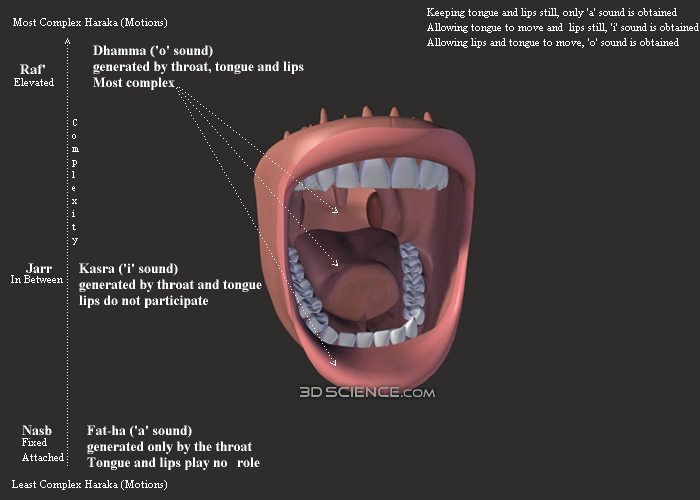
These seemingly simple motions of the lips and tongue, and seemingly obvious and meaningless sounds, are indeed generated by one of the most marvelous molecular inventions, an add-on in humans that the apes and other primates are missing. The purpose of a complete overhaul of human respiratory system and its underlying neural complexity is exclusively for the sake of prolonged speech:
The Evolution of Human Speech: The Role of Enhanced Breathing Control
ANN M. MACLARNON AND GWEN P. HEWITT
School of Life Sciences, Roehampton Institute London
“Based on previously published analyses, these results
demonstrate that there was an increase in thoracic innervation during
human evolution. Possible explanations for this increase include postural
control for bipedalism, increased difficulty of parturition, respiration for
endurance running, an aquatic phase, and choking avoidance. These can all
be ruled out, either because of their evolutionary timing, or because they are
insufficiently demanding neurologically. The remaining possible functional
cause is increased control of breathing for speech.
The main muscles involved in the fine control of human speech breathing
are the intercostals and a set of abdominal muscles which are all thoracically
innervated. Modifications to quiet breathing are essential for modern human
speech, enabling the production of long phrases on single expirations punctuated
with quick inspirations at meaningful linguistic breaks. Other linguistically
important features affected by variation in subglottal air pressure
include emphasis of particular sound units, and control of pitch and intonation.
Subtle, complex muscle movements, integrated with cognitive factors,
are involved. The vocalizations of nonhuman primates involve markedly less
respiratory control.
Without sophisticated breath control, early hominids would only have been
capable of short, unmodulated utterances, like those of extant nonhuman
primates. Fine respiratory control, a necessary component for fully modern
language, evolved sometime between 1.6 Mya and 100,000 ya.”
Source: Am J Phys Anthropol 109:341–363, 1999.
The following research establishes that the Phones must be encoded with their articulation as opposed to being just sounds our brains are sensitive to. The Phones are then decoded and one of the pieces of information within them is how the motor area in the brain can re-enact the same spoken sound vis-à-vis the oral motions. Take the concept one step further: Indeed these Phones are also encoded with units of spiritual cognizance which allow the listener to articulate i.e. encode spiritual entities within or feel spiritual feelings otherwise unfelt:
Speech phones are a replication code
J. R. SKOYLES
“Abstract — Our ability to map sound into pronunciation — vocal imitation — is necessary for
vocabulary learning, and so the existence of language. It is also unexplained. Here I show that
speech is imitable due because of the brain’s use of the innate sensitivities of the vertebrate
auditory system for speech motor targets. Their public nature enables speech to transmit
articulation information. These units I suggest closely link with phones, the minimal unit of
speech segmentation. The conjecture that phones function as a replicative code removes five
unexplained anomalies in language science: (i) why nearly eight hundred phones exist but
any language uses only a tiny subset of them (evolutionarily this makes no sense); (ii) why
newborn infants hear phones of all languages; (iii) why animals also hear them; (iv) why the
Wernicke’s and Broca’s areas arose from homologous areas in primates which process
imitation, and why (v) in humans these areas process nonspeech imitation.
Until now, phones have been studied in terms
such as how they transcribe pronunciation, or their
contribution through a ‘motor theory of speech’ to
word identification. I review the literature related
to imitation, and propose instead that phones should
be viewed neurobiologically as the means by which
speech transmits the articulation information used
to map speech into pronunciation.
Speech needs to carry such information otherwise
the brain would find turning overheard words into
vocal movements hard, and possibly impossible. This
is particularly so since vocal imitation imposes tough
information processing constraints.
• First, it requires mapping auditory information
not only into motor movements but movements
which recognizably recreate the original
speech.
• Second, this mapping needs to be possible for an
extraordinary variety of potential articulations —
the world’s languages use phones that differ in 13
vocal tract ‘places’ (from the lips to the space
between the vocal cords, the glottis) and do so
through no less than 11 types of movements
(nasals to lateral clicks).
• Third, on top of this variety of phones potentially
needing to be imitated, infants (who must imitate
to learn new vocabulary) face the problem that
they must copy movements made by adults with
very different shaped and sized vocal apparatuses.”
Source: Medical Hypotheses (1998) 50, 167-173
© Harcourt Brace & Co. Ltd 1998
State of Raf’ (Elevation)
Translated from ‘Lisanul Arab’,
by Ibn Manzour Afriqi:
Raf’
“One of the Divine Names of Allah: Al-Rāfi’ who elevates the believers with happiness and elevates ITs Aulia (Close Friends) with Qurb (Divine Nearness):
58:11 Allah will rise up, to ranks, those of you who believe and who have been granted (Divine) Knowledge
Raf’ is the opposite of fixing or attaching something. It is also the opposite of Khafdh (Lowering), for all applications of the concepts of lowering or lessening.
Raf’ in ‘I’rab (Science of Inflection) is the Dhamma (‘o’ sound) appended to nouns and verbs. It differs with (opposes) the grammatical states Jarr (Suffix ‘i’ sound, Kasra) and Nasb (Suffix ‘a’ sound, Fat-ha); Mubtada’ (The Beginning) elevates the Khabar (Information) and vice versa, for they help with each other’s elevation.”
Dara: Accumulation of Ilm (Divine Knowledge) or access to inmost inert concealed Ma’refa (Unlearned Knowledge) or prehension of Tauhid (Divine Oneness) glides the servant upwards towards Allah, sometimes with the feeling of felicity and sometimes with the feeling of closeness. The proper way to say this is: Allah makes them glide upwards. The more the servant is lowly, i.e. tied to daily life and personal gains and desires, the more the gliding is hampered.
Note: States of Jarr and Nasb (see below) are all about connections and boundaries while the state of Raf’ is about breaking all connections and trespassing beyond all boundaries.
لسان العرب ابن منظور
رفع
في أَسْماءالله تعالى الرافِعُ: هو الذي يَرْفَعُ المؤْمن بالإِسعاد وأَولياءَه بالتقْرِيب. والرَّفْعُ: ضدّ الوَضْع، رَفَعْته فارْتَفَع فهو نَقيض الخَفْض في كل شيء، رَفَعه يَرْفَعُه رَفْعاً ورَفُع هو رَفاعة وارْتَفَع. والمِرْفَع: ما رُفِع به. وقوله تعالى في صفة القيامة: خافِضةٍ رافِعة؛ قال الزجاج: المعنى أَنها تَخْفِض أَهل المعاصي وتَرْفَع أَهل الطاعة.
والرَّفْعُ في الإِعراب: كالضمّ في البِناء وهو من أَوضاع النحويين، والرَّفعُ في العربية: خلاف الجر والنصب، والمُبْتَدأُ مُرافِع للخبر لأَنَّ كل واحد منهما يَرْفَع صاحبه.
Dara: It seems that the icon for an elevator is most suited to depict the state of Raf’ (Elevation). Mind you the elevation has gradations and each gradation is a universe all to itself, like the floor-levels of a building, each a space all to itself.
Al-Rahman-u: Dhamma (‘o’ sound at the end of the Rahman) places the Divine Name into the state of Raf’ (Elevation). We can view the concept of elevation in a myriad of ways: Rahman requires complexity of knowledge(s) and cognizance(s) to be attained just as a lofty entity requires gliding if it is to be reached; all else in creation (as the Surah indicates) are mere substances making up the very elevation and gliding necessary to reach Rahman; all we are and all we see around us are nothing but mere steps of elevations for a terrific cosmic glide towards the Rahman; The ‘o’ phoneme at the end of the Rahman is indicative of the immense quantities of complexity required to reach to this lofty state of the Divine Presence; the lips are to be curled, single expiration is passed from the Fat-ha (‘a’ sound as in ‘cat’) of Al- (the) to the final Dhamma (‘o’ sound) in order to articulate Al-Rahman-u, from the gut muscles to the entire thoracic region via the larynx and pharynx up to the deepest of our cognitive faculties are synchronized and orchestrated to produced the prolonged sound of ‘o’ at the end of the Rahman; now imagine if you continued to expirate the ending ‘o’ sound, that symbolizes the complexities required to form the continuum around us (and within us), from time to space to matter to all that we can observe and the unobservable(s), for all entities to continue being or transporting from one state to another, a Divinely exotic energy-form Mumāsika (from Yumsikuhunna in 67:19) is required that fuels the continuity and all that which is continuous, the very source of this exotic energy-form is the ‘o’ sounding phoneme:
67:19 Do they not observe the bird (single, genus of all flying animals) above them, spreading their wings and folding them in? None can uphold them (plural, all birds) (to continue to fly for millions of years, bird after bird) except Al-Rahman-u
أَوَلَمْ يَرَوْا إِلَى الطَّيْرِ فَوْقَهُمْ صَافَّاتٍ وَيَقْبِضْنَ مَا يُمْسِكُهُنَّ إِلَّا الرَّحْمَنُ
This Dhamma (‘o’ sound) is a code that is transported from the Malakut (Spiritual Realm) to this world; we hear this code as the sound ‘o’, but with this code is also carried the decoding entities that, once the human being is able to apply them, the actual knowledge behind the phoneme ‘o’ is decoded/uncovered and marvellous new insights from the other universe is rendered available in this universe in order that the human heart and mind may glide aloft and upwards.
The latter makes each human being a Divine Translator who is able to take Spiritual Knowledge and code/encode them into sounds and letters of alphabets, drawings, thoughts and emotions, software/hardware calculations and theories and so on:
2:33. (Allah) said: O Adam inform them (the angels, with information about themselves, that even they did not know!)
قَالَ يَا آَدَمُ أَنْبِئْهُمْ
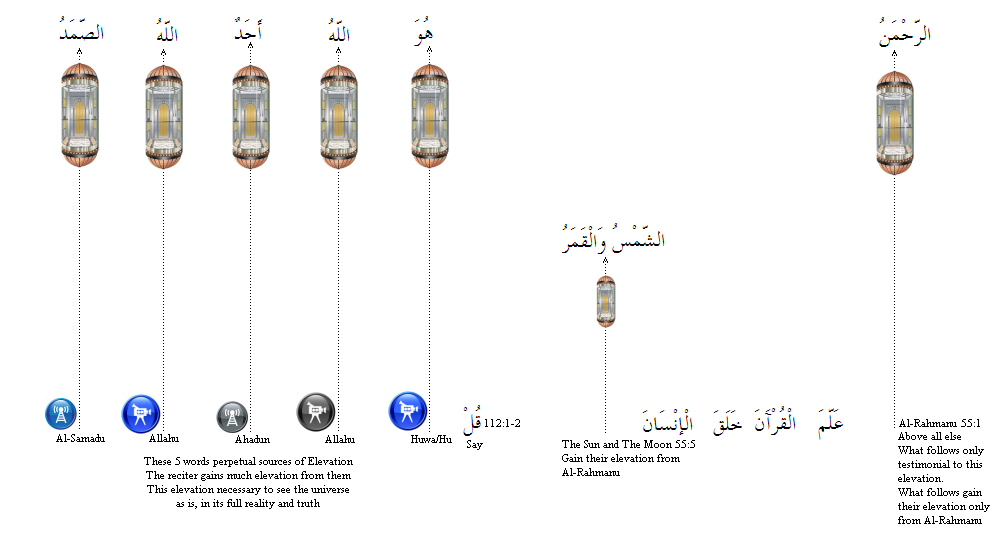
All pronouns are in the state of Raf’ i.e. elevated, since they require other entities to be around endowed with cognitive faculties to form societies capable of understanding the concept of personal pronouns e.g. I, you, we, they, or he, and the latter (hu, he) introduces complexity. In 112:1 Hu/Huwa (IT, He, third person personal pronoun) is thus elevated (by virtue of it’s dhamma, ‘o’ sound) and it is also a Mubtada’ (see below). Mubtada means a (head) part of the sentence, usually the beginning, about which the rest of the sentence gives information or expresses concepts. Similarly, in English grammar there is ‘subject’ and ‘predicate’; mubtada’ is subject, and khabar is the predicate, the information. Here, to represent mubtada’ (beginning, subject) we have given the ideogram of a camcorder, i.e. mubtada (beginning) it is like a video source, into which the rest of the sentence feeds its Khabar (information, predicate), or in the sense that the rest of the sentence is the broadcast of the video!
In the case of 112:1 (Qul Huwa Allahu Ahad, Say IT/He is Allah, the One), the word Huwa (IT, He) is a source but has no broadcasting, in contrast to the word Allah which has information about Huwa (IT), broadcast in the form of Ahad (being one) and Samad (being the master of all) i.e. this information is broadcast optical-like Nur (Divine Light). This lack of broadcast gives this source Huwa (Mubtada’) a unique type: knowledge and cognizance of the Hu is something very special – not a public affair, but a unique gnosis only for the very gifted, who are close to Allah.
Ibn Arabi
Kitab (Book) of Alif
“For that matter, the Jews asked Muhammad, peace be upon him: Tell us the Nasab (Origin) of your Lord, therefore Allah revealed: Say Huwa (is) Allah Ahad (One) 112:1” they did not say “describe” or “characterize” indeed they asked for the Nasab (Origin).”
Therefore the ideograms above that show the camera sources and broadcasters, as a collective, are describing a Nasab (Origination) rather than providing an explanation.
رسائل ابن عربي
كتاب الألف
فقال اليهود لمحمد عليه السلام انسب لنا ربك فأنزل الله تعالى: قل هو الله أحد
فجاء بالنسب و لم يقولوا صف و لا انعت
State of Jarr (Being Tugged)
Jaarr & Majrur

Example:
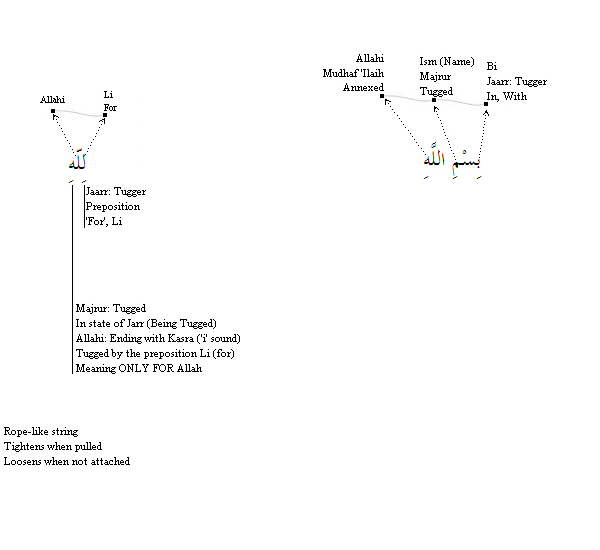
The messenger ‘of’ Allah or ‘in’ the name of Allah or ‘by’ Allah or ‘towards’ Allah, are possible and correct sentences because Allah has allowed for an entity which we recognize in lingual and geometrical renditions, to be in relationship to Allah! Similarly, ‘of’ in a vitiated form, e.g.“hat ‘of’ Dara”, allows for such relationships and associations between humans and other entities.
State of Nasb (Outer-Boundary)
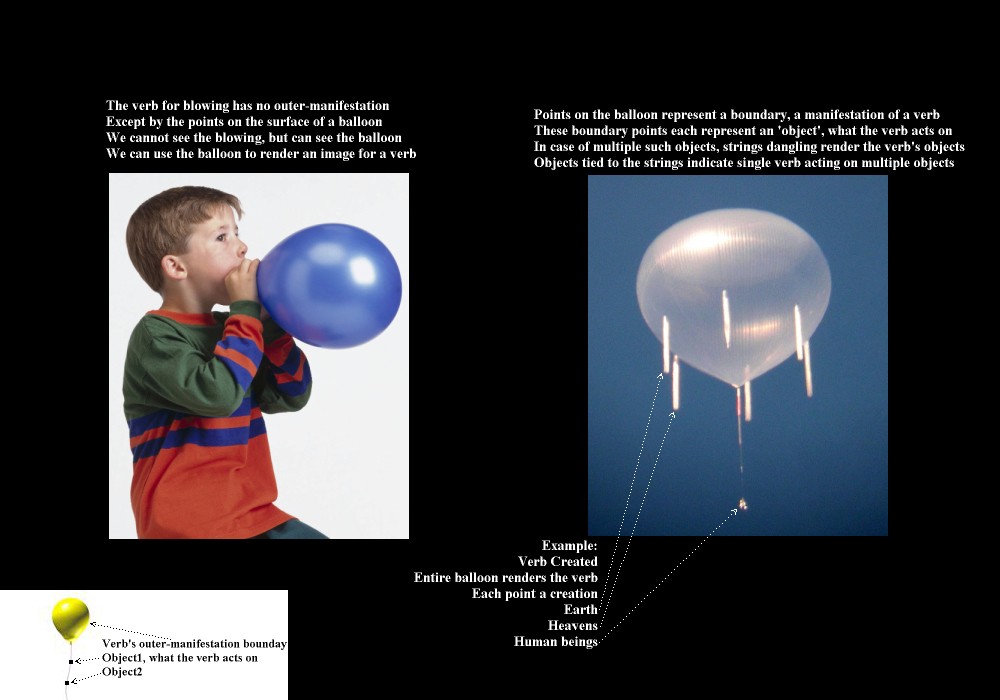
Example:
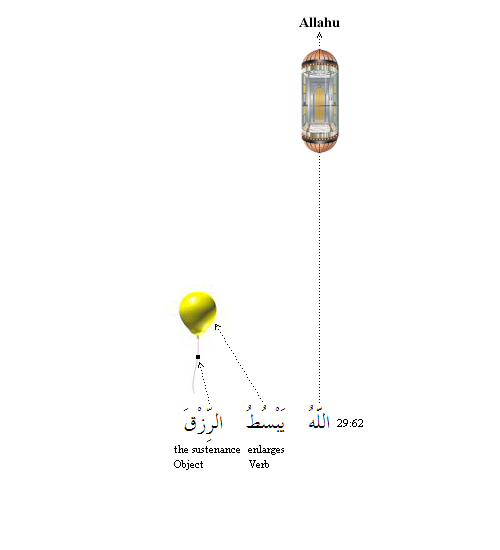
The above concepts of boundaries and the balloon representation have been adopted from the below, the ancient writings of the Arab grammarians:
From Lisanul Arab
by Ibn Manzour Afriqi:
“Nasb is placing something some place and raising it (e.g. flag pole vertically).
Nasb is also the outer-limit or outer-boundary.
Stones placed on tops of cliffs or hills to guide by them.
Nasb of Haram, the outer-perimeter of the Haram.
Stones placed around the edge of a pool.
Visual Nasb: Something erected so it is not hidden from the viewer.”
لسان العرب ابن منظور
والنَّصْبُ: وَضْعُ الشيءِ ورَفْعُه، نَصَبه يَنْصِبُه نَصْباً،
والنَّصِيبةُ والنُّصُبُ: كلُّ ما نُصِبَ، فجُعِلَ عَلَماً
والنَّصْبُ والنُّصُبُ: العَلَم المَنْصُوب. وفي التنزيل العزيز: كأَنهم إِلى نَصْبٍ يُوفِضُونَ؛ قرئ بهما جميعاً، وقيل: النَّصْبُ الغاية، والأَول أَصحّ. قال أَبو إِسحق: مَن قرأَ إِلى نَصْبٍ، فمعناه إِلى عَلَمٍ مَنْصُوبٍ يَسْتَبِقُون إِليه؛
والتَّناصِيبُ: الأَعْلام، وهي الأَناصِيبُ، حجارةٌ تُنْصَبُ على رؤوس القُورِ، يُسْتَدَلُّ بها؛ وقول الشاعر: وَجَبَتْ له أُذُنٌ، يُراقِبُ سَمْعَهـا بَصَرٌ، كناصِبةِ الشُّجاعِ المُرْصَدِ
يريد: كعينه التي يَنْصِبُها للنظر.
ابن سيده: والأَنْصابُ حجارة كانت حول الكعبة، تُنْصَبُ فيُهَلُّ عليها، ويُذْبَحُ لغير اللّه تعالى.
وأَنْصابُ الحرم: حُدوده.
والنُّصْبةُ: السَّارِية.
والنَّصائِبُ: حجارة تُنْصَبُ حَولَ الحَوض، ويُسَدُّ ما بينها من الخَصاص بالمَدَرة المعجونة، واحدتها نَصِيبةٌ؛ وكلُّه من ذلك.
وقال الليث: النَّصْبُ رَفْعُك شيئاً تَنْصِبُه قائماً مُنْتَصِباً، والكلمةُ المَنْصوبةُ يُرْفَعُ صَوْتُها إِلى الغار الأَعْلى، وكلُّ شيءٍ انْتَصَبَ بشيءٍ فقد نَصَبَهُ. الجوهري: النَّصْبُ مصدر نَصَبْتُ الشيءَ إذا أَقَمته.
والنَّصْبُ: إِقامةُ الشيءِ ورَفْعُه؛ وقوله: أَزَلُّ إِنْ قِيدَ، وإِنْ قامَ نَصَبْ
هو من ذلك، أَي إِن قام رأَيتَه مُشْرِفَ الرأْس والعُنُق.
قال ثعلب: لا يكون النَّصْبُ إِلا بالقيام.
وقال مرة: هو نُصْبُ عَيْني، هذا في الشيءِ القائم الذي لا يَخْفى عليَّ، وإِن كان مُلْقىً؛ يعني بالقائم، في هذه الأَخيرة: الشيءَ الظاهرَ. القتيبي: جَعَلْتُه نُصْبَ عيني، بالضم، ولا تقل نَصْبَ عيني.
4. Mubtada’ (Beginning) & Khabar (Information)
Khabar (News, Information): This is usually a noun or a phrase issuing some useful information about the Mubtada’ (Beginning). In Arabic grammar, the Khabar can be omitted for a variety of purposes; the Mubtada’ (Beginning) is then left without any explanation.
Example:
1. “Allah is our Lord”: ‘Allah’ is Mubtada’ (Beginning) and ‘our Lord’ is Khabar (News, Information).
2. “And it is better for you that you fast” [2:184]: ‘that you fast’ is Mubtada’ (Beginning) while ‘it is better for you’ is Khabar (News, Information).
Mubtada’ primary is rendered as a blue camera, secondary a grey camera.
Khabar primary is rendered as a blue broadcast antenna, secondary a grey one.
From ‘Secrets of Arabic’,
by Al-Anbari:
“Mubtada’ is any word that has been unaffected by any grammatical operatives that could have operated on it, either by an explicit or implicit operator. Kana (‘is’ or ‘was’) and its siblings are examples of explicit operators, also Inna (Indeed, whereas, behold, verily) and its siblings and Zanan-tu (I suspected) and its siblings. Implicit operators are similar but they are omitted e.g. ‘When the sky (shall become (Yakuna)) sundered [84:1]’.
Or Mubtada’ is any word that is unaffected by any semantic operators e.g. Ha-Za (This) which is a Mubtada’ or the occurrence of a present/future verb in place of a noun, e.g. I passed by a man (who) is writing, i.e. present continuous verb ‘is writing’ is in place of the noun ‘writer’. “
Dara: To summarize the above: Mubtada’ is the beginning of a sentence or a phrase which has no grammatical operative acting on it, hence the beginning, e.g. a doer is Mubtada’ since it does things that start the sentences or a pronoun. Mubtada’ is usually a noun about which information is transmitted within the rest of the Arabic sentence. It is always in Raf’ (Nominative) state. The Mubtada’can also be a phrase. For example, “Allah is our Lord”: ‘Allah’ is Mubtada’ (Beginning).
أسرار العربية
المؤلف : كمال الدين أبو البركات عبد الرحمن بن أبي سعيد الأنباري
باب المبتدأ
إن قال قائل ما المبتدأ قيل كل اسم عريته من العوامل اللفظية لفظا او تقديرا فقولنا اللفظية احترازا لأن العوامل تنقسم إلى قسمين إلى عامل لفظي و إلى عامل معنوي:
فأما ا للفظي فنحو كان وأخواتها وإن وأخواتها وظننت وأخواتها وقولنا تقديرا احترازا من تقدير الفعل في نحو قوله تعالى ( إذا السماء انشقت ) وما أشبه ذلك وأما المعنوي فلم يأت إلا في موضعين عند سيبويه وأكثر البصريين هذا أحدهما وهو الابتداء والثاني وقوع الفعل المضارع موقع الاسم في نحو مررت برجل يكتب فارتفع يكتب لوقوعه موقع كاتب
و أضاف أبو الحسن الأخفش إليهما موضعا ثالثا وهو عامل الصفة فذهب إلى أن الاسم يرتفع لكونه صفة لمرفوع وينتصب لكونه صفة لمنصوب وينجر لكونه صفة لمجرور وكونه صفة في هذه الأحوال معنى يعرف بالقلب ليس للفظ فيه حظ وسيبويه وأكثر البصريين يذهبون إلى أن العامل في الصفة هو العامل في الموصوف ولهذا موضع نذكره فيه إن شاء الله تعالى
From ‘Secrets of Arabic’
by Al-Anbari:“Mubtada’ is elevated (Marfu’) or in the state of Raf’ (Elevation) because it is above all the grammatical operators of a sentence! Others said it is elevated since the rest of the sentence informs about it (So it is the entity with most information about it). Some others said that both Mubtada’ and Khabar elevate each other since they both give information about the other. “
فإن قيل بماذا يرتفع الاسم المبتدأ قيل اختلف النحويون في ذلك فذهب سيبويه ومن تابعه من البصريين إلى أنه يرتفع بتعريه من العوامل اللفظية وذهب بعض البصريين إلى أنه يرتفع بما في النفس من معنى الإخبار عنه وقد ضعفه بعض النحويين وقال لو كان الأمر كما زعم لوجب ألا ينتصب إذا دخل عليه عامل النصب لأن دخوله عليه لم يغير معنى الإخبار عنه ولوجب ألا يدخل عليه مع بقائه فلما جاز ذلك دل على فساد ما ذهب إليه وأما الكوفيون فذهبوا إلى أنه يرتفع بالخبر وزعموا أنهما يترافعان وأن كل واحد منهما يرفع الآخر وقد بينا فساده في مسائل الخلاف بين البصريين والكوفيين
فإن قيل فلم جعلتم التعري عاملا وهو عبارة عن عدم العوامل قيل لأن العوامل اللفظية ليست مؤثرة في المعمول حقيقة وإنما هي أمارات
وعلامات فالعلامة تكون بعدم شيء كما تكون بوجود شيء ألا ترى أنه لو كان معك ثوبان و أردت أن تميز أحدهما عن الآخر لكنت تصبغ أحدهما مثلا وتترك صبغ الآخر فيكون عدم الصبغ في أحدهما كصبغ الآخر فتبين بهذا أن العلامة تكون بعدم شيء كما تكون بوجود شيء وإذا ثبت هذا جاز أن يكون التعري من العوامل اللفظية عاملا
From ‘Secrets of Arabic’
by Al-Anbari:“There are three reasons that the Mubtada’ is exclusively in the state of Raf’ (Elevation):1. Mubtada’ is the strongest (most important) element in the sentence; that is, the rest of the sentence is about it (or it is the most complex element in the sentence since the rest of the sentence explains it) and therefore the most complex Haraka (Motion) of the mouth tissues is assigned to Mubtada’ and that is the ‘o’ sound or the state of Raf’ (Elevation).
2. Mutada’ is the beginning of the sentence, so is the elevation the beginning of something (e.g. head is the beginning of a standing human being), therefore Mubtada’ is given the state of Raf’ (Elevation).
3. The rest of the sentence informs about the Mubtada’, just like the sentence that informs about the doer and since the doer is in the state of Raf’ (Elevation) then Mubtada’ is in the same state as well. ”
فإن قيل فلم خص المبتدأ بالرفع دون غيره قيل لثلاثة أوجه
أحدها أن المبتدأ وقع في أقوى أحواله وهو الابتداء فأعطي أقوى الحركات وهو الرفع
والوجه الثاني أن المبتدأ أول والرفع أول فأعطي الأول الأول.
والوجه الثالث أن المبتدأ مخبر عنه كما أن الفاعل مخبر عنه والفاعل مرفوع فكذلك ما أشبهه فإن قيل لماذا لا يكون المبتدأ في الأمر العام إلا معرفة قيل لأن المبتدأ مخبر عنه و الإخبار عمن لا يعرف لا فائدة فيه فإن قيل فهل يجوز تقديم خبر المبتدأ عليه نحو قائم زيد قيل اختلف النحويون في ذلك فذهب البصريون إلى أنه جائر وذهب الكوفيون إلى أنه غير جائر وأنه إذا تقدم عليه الخبر يرتفع به ارتفاع الفاعل بفعله وقالوا لو جوزنا تقديم خبر المبتدأ عليه لأدى ذلك إلى تقديم ضمير الاسم على ظاهره وذلك لا يجوز وهذا الذي ذهبوا إليه فاسد وذلك لأن اسم الفاعل اضعف من الفعل في العمل لأنه فرع عليه فلا يعمل حتى يعتمد ولم يوجد ههنا فوجب ألا يعمل وقولهم أن هذا يؤدي إلى تقديم ضمير الاسم على ظاهره فاسد أيضا لأنه وان كان مقدما لفظا إلا أنه مؤخر تقديرا وإذا كان مقدما في اللفظ مؤخرا في التقدير كان تقديمه جائزا قال الله تعالى ( فأوجس في نفسه خيفة موسى ) فالهاء في نفسه ضمير موسى وان كان في اللفظ مقدما على موسى إلا أنه لما كان موسى مقدما في التقدير والضمير في تقدير التأخير كان ذلك جائزا فكذلك ههنا والذي يدل على جواز ذلك وقوع الإجماع على جواز ضرب غلامه زيد وهذا بيّن.
وكذلك اختلفوا في الظرف إذا كان مقدما على المبتدأ نحو عندك زيد فذهب البصريون إلى أنه في موضع الخبر كما لو كان متأخرا وذهب الكوفيون إلى أن المبتدأ يرتفع بالظرف ويخرج عن كونه مبتدأ و وافقهم على ذلك أبو الحسن الأخفش في أحد قوليه وفي هذه المسالة كلام طويل بيناه في المسائل الخلافية لا يليق ذكره بهذا المختصر.
From ‘Secrets of Arabic’,
by Al-Anbari“Khabar (Information, News) for the Mubtada’ (Beginning) is of two sorts:1. Single word: Either it is a noun that is not an attribute, e.g. Zaid ,or it is an attribute. In ‘Zaid is your brother and Amru is your son’ Zaid is the Mubtada’ therefore ‘your brother’ is its Khabar, again Amru is Mubtada’ and ‘your son’ is Khabar. In ‘Zaid is an attacker’ or ‘Amru is nice’, both attributes ‘attacker’ and ‘nice’ are Khabar.
2. Phrase: Either it is a sentence starting with a noun e.g. ‘Zaid’s father is departed’ both ‘Zaid’ is primary Mubtada’ and ‘(his) father’ the secondary Mubtada’ and therefore ‘departed’ is the Khabar. Or a sentence that starts with a verb e.g. ‘Left Zaid’s father and Amru’. (Dara: “Zaid’s father and Amru” give Khabar (Information) about the mubtada’ verb ‘to leave’)“
أسرار العربية
المؤلف : كمال الدين أبو البركات عبد الرحمن بن أبي سعيد الأنباري
باب خبر المبتدأ
إن قال قائل على كم ضربا ينقسم خبر المبتدأ قيل على ضربين مفرد و جملة
فإن قيل على كم ضربا ! ينقسم المفرد قيل على ضربين أحدهما أن يكون اسما غير صفة والآخر أن يكون صفة
أما الاسم غير الصفة فنحو زيد أخوك وعمرو غلامك فزيد مبتدأ و أخوك خبره وكذلك عمرو مبتدأ وغلامك خبره وليس في شيء من هذا النحوا ضمير يرجع إلى المبتدأ عند البصريين وذهب الكوفيون إلى أن فيه ضميرا يرجع إلى المبتدأ وبه قال علي بن عيسى الرماني من البصريين والأول هو الصحيح لأن هذه أسماء محضة والأسماء المحضة لا تتضمن الضمائر
وأما ما كان صفة فنحو زيد ضارب وعمرو حسن وما أشبه ذلك ولا خلاف بين النحويين في أن هذا النحو يتحمل ضميرا يرجع إلى المبتدأ لأنه يتنزل منزلة الفعل ويتضمن معناه.
فإن قيل على كم ضربا تنقسم الجملة قيل على ضربين جملة اسمية وجملة فعلية فأما الجملة الاسمية فما كان الجزء الأول منها اسما وذلك نحو زيد أبوه منطلق فزيد مبتدأ أول و أبوه مبتدأ ثان ومنطلق خبر عن المبتدأ الثاني والمبتدأ الثاني وخبره خبر عن المبتدأ الأول وأما الجملة الفعلية فما كان الجزء الأول منها فعلا وذلك نحو زيد ذهب أبوه و عمرو إن تكرمه يكرمك وما أشبه ذلك أما الظرف وحرف الجر فاختلف النحويون فيهما فذهب سيبويه وجماعة من النحويين إلى أنهما يعدان من الجمل لأنهما يقدر معهما الفعل فإذا قال زيد عندك وعمرو في الدار كان التقدير زيد استقر عندك وعمرو استقر في الدار.
5. Why were Hamza, Ya, Ta and Nun prefixed to the present/future verbs?
From ‘Secrets of Arabic’
by Al-Anbari:
“Originally these prefixes were the three Madd (Prolonging, Continuation) letters i.e. Waw, Ya and Alif”.
Dara: A Madd (Prolonging, Continuation) letter needs to be added to the beginning of a verb to make it render a prolonged or continuous action from present into future. Therefore the letters that had the Phonemes i.e. recognized minimal units of sounds, which could be uttered by the mouth region and maintain an indefinite prolonged pronunciation/exhalation were chosen for this task to represent or TAG continuity and prolongation from present into future. These prolong-able prefixed phonemes are:
1. Waw: (English equivalent of the English ‘double-u’ (w); It gives prolongation to the dhamma sound ‘o’. When one Waw follows another immediately they together sound as ‘oo’ in ‘fool’. Therefore you can indefinitely prolong, via exhalation, the phoneme ‘oooooooooooooooooooo…’
2. Ya: (English equivalent is ‘y’, a prolongation of the sound ‘i’, kasrah phoneme) When one Ya follows another Ya immediately they together sound as ‘ee’ in ‘eel’. Therefore you can indefinitely prolong, via exhalation, the phoneme: ‘eeeeeeeeeeeeeeeee…’
3. Alif: When one Alif follows another Alif immediately they together sound as ‘a’ in ‘ah!’. Therefore you can indefinitely prolong, via exhalation, the phoneme: ‘aaaaaaaaaaaaaaaaa…’
أسرار العربية
المؤلف : كمال الدين أبو البركات عبد الرحمن بن أبي سعيد الأنباري
باب المعرب و المبني
إن قال قائل ما المعرب والمبني قيل أما المعرب فهو ما تغير آخره بتغير العامل فيه لفظا أو تقديرا وهو على ضربين اسم متمكن وفعل مضارع فالاسم المتمكن ما لم يشابه الحرف ولم يتضمن معناه
والفعل المضارع ما كانت في أوله إحدى الزوائد الأربع و هي الهمزة والنون والتاء و ا لياء فإن قيل لم زيدت هذه الأحرف دون غيرها قيل لأن الأصل أن تزاد حروف المد واللين وهي الواو والياء والألف
Dara: Human being is the medium for Divine Translation (decoding); he translates/decodes the
Divine Knowledge and Information from the Malakut (
Realm of Spirits) to the Mulk (Corporeal Realm) and Malakut (Realm of Spirits), whether he wills or not, consciously or subconsciously, alive or unliving, pious or evil; an extraordinary Divine Instrumentation for the sole purpose of transference of Divine Knowledge from the lit regions of Wujud (Being-ness) to the unlit darkling regions of both Being and Non-Being (‘Adam); and to this end his
thoracic instrumentation genomically modified/perfected in order for him to utter prolonged
phonemes, and to switch between 800+ such phonetic units, willingly or unwillingly, to acoustically articulate the architecture of flow of potentialities and uncertainties within the continuum of time vs. the indivisible incurable actualities of Qidam (Realm of all actualities free of probabilities); like unto a song-bird singing-flying through the atmosphere of Hudhur (Divine Presence), distinguished from the rest of the creation, performing ceaselessly for the audience of all that is and for all that was and for all that will be, an incessant song uncovering (Kashf) the Divine Architecture of the passage of time. His ability to pronounce ‘ooooo’ and at the same breath (without the need to inhale) switching to ‘eeeeeeee’ or ‘aaaaaaaaaaaa’ are unique to his
thoracic anatomy and genetics, a Divine Translator equipped with Divine Phonetics as the Song Bird of Eden who decodes the thoracic-based sounds into the immovable truth about the time and the Owner of Time. From his lips, nasals, throat and
thoracic regions expirates sounds that can give life to the unliving, give love to the unloving, and traverse unnumbered universes, and all that through a few grams of skin, muscle, bone and cartilage; a testament to the ubiquitous greatness of Master of Time
Hu generously shared with human beings the cognizance of potentialities and actualities and the benevolent passage of time:2:37. Then received Adam from his Lord words , and his Lord Turned towards him; for
Hu/He is Oft-Returning, Most Merciful.
فَتَلَقَّى آَدَمُ مِنْ رَبِّهِ كَلِمَاتٍ فَتَابَ عَلَيْهِ إِنَّهُ هُوَ التَّوَّابُ الرَّحِيمُ )
Azizam (My Dearest) those ‘words’ were partly the genomic modification (new nucleotide sequences added) to his thoracic anatomy and nervous system to empower him to yearn and sob, and to hope and laugh in a verbose manner behind the reach of the highest ranking angel, with tiny expenditure of energy for minute oral motions and silent expirations of his lungs and imperceptible movements of thoracic region of his torso. And this thoracic modification was necessary for his Lord to turn to him to hear his sobs and to listen to the articulate moan of his yearning, while he sat or while he walked or while he slept; for Adam ran through the gardens of Eden broken-hearted and other than panting and screaming had no other faculties of communication to ask his Lord to hear him to forgive him!
And after the endowment of such Divine Genomic Gift, he had to be transported to a lower realm of existence for Adam to struggle to evanesce (away from imperfections) upon this ever-evanescing spiritual habitat gushing with the waters of Ma’refa (Divine Gnosis), the planet Earth:
2:38. We said: “Get you down (to become perfect) all from here; and if, as is sure, there comes to you Guidance from Me (in verbal acoustic/syntax form), whosoever follows My guidance, on them shall be no fear, nor shall they grieve (like someone loved and valued by his powerful and protecting Beloved).
قُلْنَا اهْبِطُوا مِنْهَا جَمِيعًا فَإِمَّا يَأْتِيَنَّكُمْ مِنِّي هُدًى فَمَنْ تَبِعَ هُدَايَ فَلَا خَوْفٌ عَلَيْهِمْ وَلَا هُمْ يَحْزَنُونَ )
55:26 All that is on her (earth) will evanesce (man [who] used to indicate the living who are endowed with intelligence)
كُلُّ مَنْ عَلَيْهَا فَانٍ
For the fear and sorrow did not leave Adam and his wife in gardens of Eden, even though they saw all that no eye had ever seen, but the bitter evanescence of this Earth was the sure medicine the Lord of Multiverse prescribed for him and his soulmate and all off-spring, to die once more but to leave the imperfections upon this earth, so Allah will char their vitiations to ashes upon the cosmic gales of amnesia:
18:8 And verily what is on her (earth) we shall make but as dust and dry soil (ma [what] used either to indicate both the living and the unliving, or just the unliving vitiations)
وَإِنَّا لَجَاعِلُونَ مَا عَلَيْهَا صَعِيدًا جُرُزًا
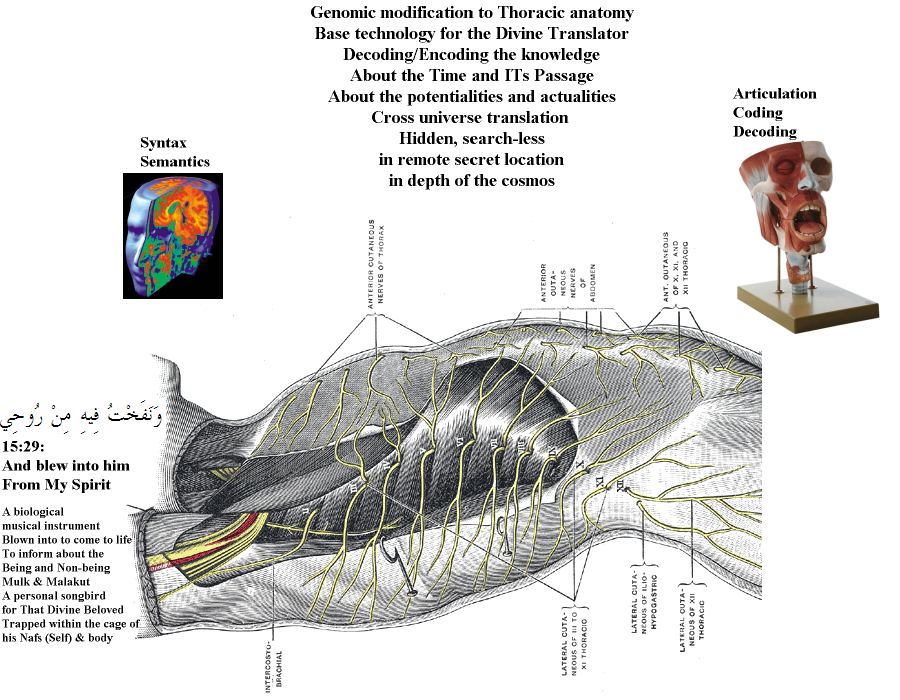
David’s Divine Oboe
“O Abu Musa, for sure you are given a wind-instrument (Oboe like) from the many wind-instruments of family of David”, said the Prophet.
Prophet, peace be upon him, did mention and use the concept of wind-instrument within the context of the reciting the Divine Words i.e. how a human being voyages from a mammal to a Divine Oboe by articulating few phonemes. Moreover the Prophet informed us that these Divine Wind-Instruments within us are indeed from the heritage of the Prophetic family of David.
See also Rumi’s Reed-Flute:
http://www.untiredwithloving.org/masnavi_1_1.html
http://www.untiredwithloving.org/masnavi_vol1_2_6.html
http://www.untiredwithloving.org/masnavi_vol1_7_14.html
زيادة الجامع الصغير، والدرر المنتثرة، الإصدار 2.05 – للإمام السيوطي
كتاب “زيادة الجامع الصغير”، للسيوطي >> حرف الياء
4066- يا أبا موسى لقد أوتيت مزمارا من مزامير آل داود.
(خ ت) عن أبي موسى.
زيادة الجامع الصغير، والدرر المنتثرة، الإصدار 2.05 – للإمام السيوطي
كتاب “زيادة الجامع الصغير”، للسيوطي >> حرف اللام
2537- لو رأيتني وأنا أستمع قراءتك البارحة لقد أوتيت مزمارا من مزامير آل داود.
(م) عن أبي موسى.أساس البلاغة الزمخشري
والزمار يزمر في المزمار: ينفخ فيه.
ويقال للحسن الصوت: لقد أوتي من مزامير آل داود، وهو جمع مزمار، كأن في حلقه مزامير، لطيب صوته، أو جمع مزمار، كأنّ في حلقه مزامير، لطيب صوته، أو جمع مزمور من مزمورات داود عليه السلام.
Mario Vaneechoutte
Department of Clinical Chemistry, Microbiology & Immunology,
Blok A, University Hospital, B 9000 Ghent, Belgium
John R. Skoyles
The evolution of intelligence: http://www.upfromdragons.com/
4.2. The musical primate
4.2.1. Humans have unique adaptations for singing.
“The idea that the origin of speech lies in our ability to sing can be traced back to at least Jean Jacques Rousseau, in the seventeenth century. It was suggested by the famous linguist Wilhelm von Humboldt in the nineteenth century and by Otto Jespersen early in this one. However, this approach to language has been ignored in more modern times. Indicative is that the word `music’ lacks in the index of the recent books of Pinker and Deacon. In recent times, music has received serious attention by some linguists, but this was done within the Chomskyan paradigm and did not address the origin of language.
Just like song birds possess highly sophisticated syringes, there are very characteristic morphological changes of the human glottis and larynx, unequalled in any mammalian species. Aitchison remarks: “Our language has more in common with the singing and calling of birds, than with the vocal signals of apes.”
The resemblance to bird song was noticed already by Charles Darwin:
“(Language) is certainly not a true instinct, for every language has to be learnt. It differs, however, widely from all ordinary arts, for man has an instinctive tendency to speak, as we see in the babble of our young children; whilst no child has an instinctive tendency to brew, bake, or write. … The sounds uttered by birds offer in several respects the nearest analogy to language, for all the members of the same species utter the same instinctive cries expressive of their emotions; and all the kinds which sing, exert their power instinctively; but the actual song, and even the call-notes, are learnt from their parents or foster-parents. These sounds, …, are no more innate then language is in man.”
Provine has shown that a unique overlooked feature of human speech is our ability to integrate respiration and vocalisation. We, as humans, breath in a way unique among the primates – since only we can neurally modulate sequences of tonal vocalisations upon our expirations. Other primates can vocalise but they are limited to only one vocalization per expiration. For example, both humans and chimpanzees laugh: however, chimpanzees do so by an `ah’, `ah’, `ah’ sequence of repeated inspirations and expirations. In contrast, we do a modulating `ha, ha, ha, ..’ or `ho, ho, ho ..’ upon a single out-breath – this modulation often going on continuous for 16 laughter syllables. Moveover, we can subtly tune our series of vocalisations upon a single continuous out-breath. Only amongst birds – not other primates – are there species that possess comparable respiratory-control ability. This underlies the curious fact that while some birds can imitate human speech, the much more closely related chimpanzee or any mammal cannot.
The neural control that allows song was, we suggest, a profound revolution: the `one breath one-vocalisation’ rule stops chimpanzees not only from laughing like humans but also from being able to control the expiration needed to speak. This, as Provine notes, is the reason why attempts to teach spoken language to chimpanzees have failed in spite of them being able to learn sign and token-based languages and even to understand spoken speech.
Neural control of respiration allows many more kinds of vocalizations: over 700 vowel, diphthongs and consonantal phones were found in a sample based upon only one-twentieth of all the world’s languages. Moreover, such control allows the concatenation of very complex sequences. Thus, vocalisations upon a single out-breath combine into words, and these in turn combine into clauses, phrases and sentences. Neural control also allows modulations to be superimposed upon these vocalisations, such as intonation (linguistic, pragmatic and emotional), and this can be upon a wide variety of speech types like whisper, song, chant, scream, motherese, `Donald-Duck speech’ and ventriloquism.”
Source: http://users.ugent.be/~mvaneech/ORILA.FIN.html
From ‘Secrets of Arabic’
by Al-Anbari:
“But Alif has no sound in and of itself, unless it is after itself or another letter or unless it is given some Haraka (Oral Movement), therefore Hamza is used in its place. (Dara: Hamza is a soundless construct that abruptly starts with a little ‘eh’, a soundless exhalation, sharply after another phoneme. Or another phoneme ends sharply in such a soundless manner) Both Alif and Hamza are free flowing air from the throat so they are very close to each other and thus Hamza is a properly chosen replacement for Alif’s lack of sound. “
Dara: Hamza is used in ‘Af’ulu (I do) and the past tense ‘Uf’alu (Done to me). These are the sharp exhalation sounds made in the beginnings of these two verbs. Mind you it is also the beginning of ‘Ana (I)! These sharp starting sounds indicate a chasm, i.e. sudden sundering from the rest of the universe, meaning the self-awareness of ‘I am other than the rest of the universe’, a form of tearing away the human from the nexus of all else, thus the sharp starting exhalation phoneme renders this partition.
إلا أن الألف لما لم يمكن زيادتها أولا لأن الألف لا تكون إلا ساكنة والابتداء بالساكن محال أبدلوا منها الهمزة لقرب مخرجيهما لأنهما هوائيان يخرجان من أقصى الحلق
From ‘Secrets of Arabic’
by Al-Anbari:“Similarly Waw is also replaced by Ta; since prefixing of Waw to words is not a part of the speech of the Arab and if its addition is necessary to the beginning of a word then it is replaced by Ta. Haven’t you heard the Arab say Turāth (Inheritance) in place of Wurāth, Tujāh (In front of) in place of Wujāh, Tukhma (Indigestible) in place of Wuhma or Tuhma (Accusation) in place of Wuhma!”Dara: Ta is used in the beginning of Taf’ulu (You do) Taf’ulāni (You two do) Taf’ulūna (You all do) Taf’ulaina (You female do) Taf’ulāni (You two females do) Taf’ulna (You all females do) and finally Taf’ulu (she female does). Note that both ‘you do’ and ‘she does’, in singular form, are the same verb Taf’ulu, i.e. these verbs were used when Adam and Eve were in presence of
Allah; Eve being a Divine Secret generated from deep within Adam, ‘she does something’ was no different ‘you do something’ for she was from him. This intimacy is noteworthy. Also ‘you two males do’ and ‘you two females do’ are the same verb Taf’ulāni due to the same metaphysical reality, i.e. in the beginning were only Adam and Eve and therefore ‘you two’ was the same regardless of gender. Again, in the same vein, Taf’ulāni is for ‘she two females do’.
These verbs have Haraka (Oral Motion) of Fat-ha for the starting Ta, since this Haraka is the least complex of all phonemes. But the passive counter parts have the Haraka (Oral Motion) of Dhamma (‘o’ sound), the most complex, since the passive concept is far more complicated than a regular verb, i.e. requires the concepts of ‘context’ ‘unknown doer’ and so on.
وكذلك الواو ايضا لما لم يمكن زيادتها أولا لأنه ليس في كلام العرب واو زيدت أولا أبدلوا منها التاء لأنها تبدل منها كثيرا ألا ترى أنهم قالوا تراث وتجاه وتخمة وتهمة وتيقور وتولج قال الشاعرا – من الرجز –
( متخذا من عضوات تولجا … )
وهو بيت الصائد والأصل وراث ووجاه ووخمة ووهمة وويقور لأنه من الوقار ووولج لأنه من الولوج فأبدلوا التاء من الواو في هذه المواضع كلها وكذلك ههنا.
From ‘Secrets of Arabic’
by Al-Anbari:
“Ya can be added to the beginning of the words without any reservation, unlike the ones above.”
Dara: Ya is added to the beginning of the third person present-future verbs i.e. Yaf’ulu (He does), Yaf’ulāni (You two do) Yaf’aluna (You all do). Ya is also added to the beginning of the female plural verb Yaf’ulna (They all females do) not to confuse with the Taf’ulna (You all females do).
وأما الياء فزيدت لأنها لم يعرض فيها ما يمنع من زيادتها كما عرض في الألف والواو
From ‘Secrets of Arabic’
by Al-Anbari:“But Nun is added since it is similar to Madd (Prolonging) alphabets. (Dara: Nun is actually Waw sandwiched between two ‘n’ sounds so it prolongs as Waw prolongs!)”
وأما النون فإنما زيدت لأنها تشبه حروف المد واللين وتزاد معها في باب الزيدين و الزيدين.
From ‘Secrets of Arabic’
by Al-Anbari:“This is how the order of addition of these letters is realized:1. Hamza: For the first person singular, ‘I’, ie. the first the human being calls his own Nafs (Self) before others.
2. Nun: For first person plural, ‘we’, ie. the person calling his own Self and other Selves.
3. Ta: Second person, ‘you’, ie. for calling the person in front of him
4. Ya: Third person, ‘he/she’, ie.For calling the absent third person.“
والتحقيق في ترتيب هذه الأحرف أن تقدم الهمزة ثم النون ثم التاء ثم الياء وذلك لأن الهمزة للمتكلم وحده والنون للمتكلم ولمن معه والتاء للمخاطب والياء للغائب والأصل أن يخبر الإنسان عن نفسه ثم عن نفسه وعمن معه ثم المخاطب ثم الغائب فهذا هو التحقيق في ترتيب هذه الأحرف في أول الفعل المضارع.
From ‘Secrets of Arabic’
by Al-Anbari:“Present-future verbs are treated the same way as the nouns, so far as the inflecting suffixes are concerned, and for that matter these present-future verbs are called Mudhari’ namely ‘similar’ (Dhara’) for they are similar siblings! These similarities are due to five reasons:1. As with the nouns, which can be definite or indefinite ( i.e. universal and unspecified), the present-future verbs can be either in present tense or in future tense. As with the nouns that can be made definite by the addition of the prefix Al- (definite article ‘the’), the present-future tense can be made into exclusively future tense by the addition of the prefix Sin- (‘s’ sound).
2. Lam (‘L’ sound) can be prefixed to both nouns and present-future verbs, e.g. Lam for verbs is as the ‘would’ or ‘might’ in English, and again Lam for nouns is for emphasis, i.e. indeed or for sure.
3. As these verbs are used for both present and future, the nouns are also are used for double meanings e.g. ‘Ain means ‘eye’ as well as ‘a spring’ and so on.
4. You can say either ‘I passed by a man (who is) hitting’ or ‘I passed by a man, a hitter’ here the verb is equaled and exchanged for an attribute as the same is done for a noun.
5. The Haraka (Oral Movement) for the Ism-Fa’il (Verbal Noun) is the same as for the present-future verbs.“
فإن قيل فإذا كان الأصل في الفعل المضارع أن يكون مبنيا فلم حمل على الاسم في الإعراب قيل إنما حمل الفعل المضارع على الاسم في الإعراب لأنه ضارع الاسم ولهذا سمي مضارعا والمضارعة المشابهة ومنها سمي الضرع ضرعا لأنه يشابه أخاه ووجه المشابهة بين هذا الفعل والاسم من خمسة أوجه
الوجه الأول أنه يكون شائعا فيتخصص كما أن الاسم يكون شائعا فيتخصص، ألا ترى أنك تقول يقوم فيصلح للحال والاستقبال فإذا أدخلت عليه السين أو سوف اختص بالاستقبال كما أنك تقول رجل فيصلح لجميع الرجال فإذا أدخلت عليه الألف واللام اختص برجل بعينه فلما اختص هذا الفعل بعد شياعه كما أن الاسم يختص بعد شياعه فقد شابهه من هذا والوجه
الوجه الثاني أنه تدخل عليه لام الابتداء كما تدخل على الاسم ألا ترى أنك تقول أن زيدا ليقوم كما تقول أن زيدا لقائم ولام الابتداء تختص بالأسماء فلما دخلت على هذا الفعل دل على مشابهة بينهما والذي يدل على ذلك أن فعل الأمر والفعل الماضي لما بعدا عن شبه الاسم لم تدخل هذه اللام عليهما ألا ترى أنك لو قلت لأكرم زيدا يا عمرو أو إن زيدا لقام لكان خلفا من القول
والوجه الثالث أن هذا الفعل يشترك فيه الحال والاستقبال فأشبه الأسماء المشتركة كالعين ينطلق على العين الباصرة وعلى عين الماء وعلى غير ذلك
و الوجه الرابع أنه يكون صفة كما يكون الاسم كذلك تقول مررت برجل يضرب كما تقول مررت برجل ضارب، فقد قام يضرب مقام ضارب
والوجه الخامس أن الفعل المضارع يجري على اسم الفاعل في حركاته وسكونه ألا ترى أن يضرب على وزن ضارب في حركاته وسكونه ولهذا عمل اسم الفاعل عمل الفعل، فلما أشبه الفعل المضارع الاسم من هذه الأوجه استحق جملة الإعراب الذي هو الرفع والنصب والجزم ولكل واحد من هذه الأنواع عامل يختص به
6. Why is the past tense verb based upon a Haraka (Oral Movement)?From ‘Secrets of Arabic’
by Al-Anbari:“The past tense verbs are based upon a Haraka (Oral Movement) since they are to be more complex than the imperative verbs which are based upon no end-
inflection i.e. Sukun (Sound-less) e.g. ‘Uktub (Do write) the Ba (‘b’ sound) has free of any Haraka (Oral Movement). Moreover the past tense verbs are names for objects to render their attributes e.g. ‘I passed by a man (while he) hit’ or ‘I passed by a hitter’; here ‘hitter’ is an attribute for a man who was hitting in the past. Also past tense verbs do resemble names in conditional statements e.g. ‘if you did, I did’ i.e. ‘if you do I will do as well’; here ‘I did’ is treated like a noun and again here ‘I did’ is treated like a present-future tense verb which again acts like a noun.”
Dara: Imperative verbs are actions that have not yet taken place, so they have nil complexity (and therefore nil Haraka, Oral Movement)! Past tense verbs have complexity (i.e. actions that took place in the past consumed resources and transmitted information and produced side-effects) therefore they are given a Haraka (Oral Movement) in order for them to be distinct from the imperative nil-complexity verbs.
أسرار العربية
المؤلف : كمال الدين أبو البركات عبد الرحمن بن أبي سعيد الأنباري
باب إعراب الأفعال وبنائها
إن قال قائل لم كانت الأفعال ثلاثة ماض وحاضر ومستقبل قيل لأن الأزمنة لما كانت ثلاثة وجب أن تكون الأفعال ثلاثة ماض وحاضر ومستقبل.
فإن قيل فلم بني الفعل الماضي على حركة ولم كانت الحركة فتحة قيل إنما بني أولا لأن الأصل في الأفعال البناء – وبني على حركة تفضيلا له على فعل الأمر لأن الفعل الماضي أسماء الأشياء في الصفة نحو قولك مررت برجل ضرب كما تقول مررت برجل ضارب وأشبه أيضا ما أشبه الأسماء في الشرط والجزاء فإنك تقول إن فعلت فعلت والمعنى فيه إن تفعل أفعل فلما قام الماضي مقام المستقبل والمستقبل قد أشبه الأسماء فقد أشبه ما أشبه الأسماء فلما أشبه ما أشبه الأسماء وجب أن يبنى على حركة تفضيلا له على فعل الأمر الذي ما أشبه الأسماء ولا أشبه ما أشبهها
7. Why are past tense verbs based upon the Haraka (Oral Movement) of Fat-ha (‘a’ sound in ‘cat’)?
From ‘Secrets of Arabic’
by Al-Anbari:
“Indeed Fat-ha (‘a’ sound in ‘cat’) is the least complex of all Harakat (Oral Movements), and past tense verbs necessarily have to be based upon least complexity. Any other Haraka (Oral Movement) has more complexity to it and therefore cannot represent the least complex past-tense.”
Dara: Past tense is already done and finished, no longer has any potentialities or probabilities attributed to it and it is atomic and no statistic applies to its instantiated occurrence. For that reason it is the least complex of all other verbs, e.g. present or future verbs, on the contrary, require magnificent potentiality-structures built within a divisible continuum with assigned probabilities and statistics and unnumbered many such spaces. For that matter past tense is the least complex of all verbs and therefore it has the inflection of least complex mouth area tissue movements i.e. Fat-Ha (‘a’ sound in ‘cat’).
‘he did’ is Fa+’a+La with all ‘a’ sound as in ‘cat’, so the past tense verbs are mostly build using the Fat-ha Haraka (Oral Motion).
وإنما كانت الحركة فتحة لوجهين:
أحدهما أن الفتحة أخف الحركات فلما وجب بناؤه على حركة وجب أن يبنى على أخف الحركات والوجه الثاني أنه لا يخلو إما أن يبنى على الكسر أو على الضم أو على الفتح بطل أن يبنى على الكسر لأن الكسر ثقيل والفعل ثقيل والثقيل لا ينبغي أن يبنى على ثقيل وإذا كان الجر لا يدخله وهو غير لازم لثقله فألا يدخله الكسر الذي هو لازم كان ذلك من طريق الأولى
Additional Concepts
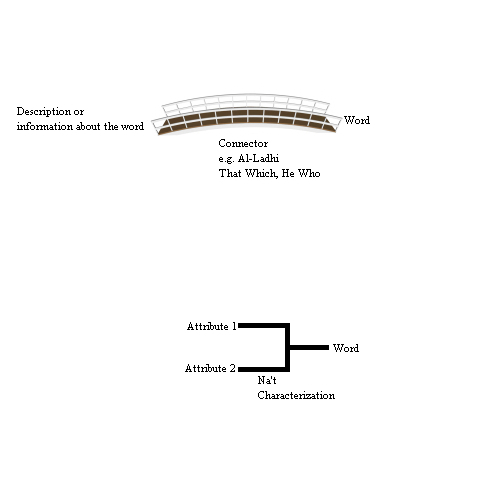
1:1-4
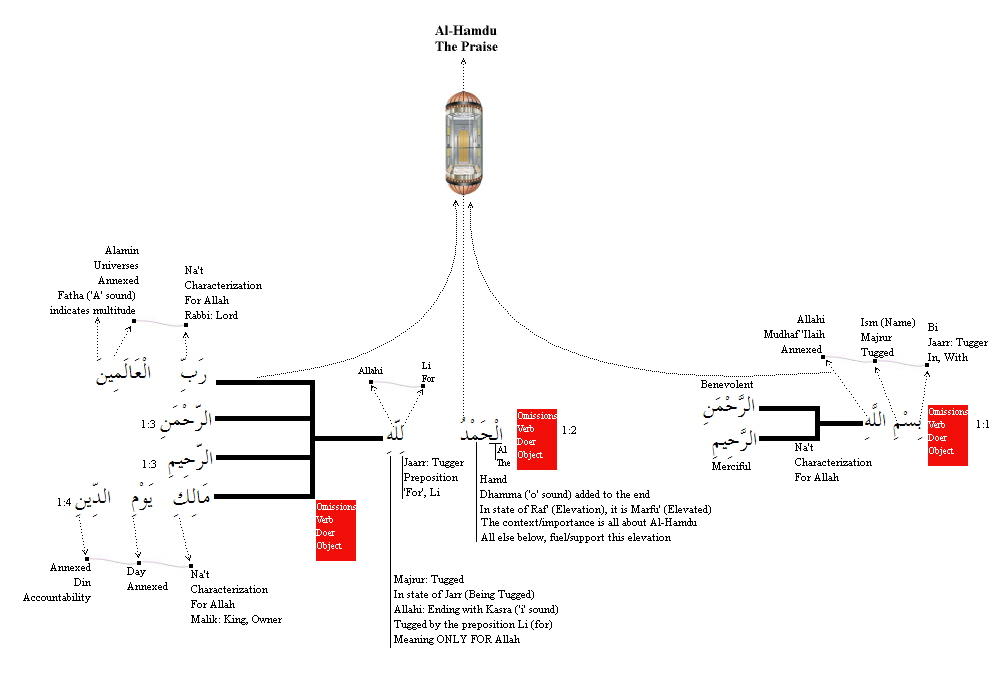
From Treatise of Ibn Arabi
Book of Al-Jalāla (The Most Momentous)
“Allah is a negation-Kalima (Divine Word) (established) firmly within the realm of ‘Alawi (Loftiest ranking Universe), all Translations glide upwards by means of her (female pronoun referring to the Kalima)”.
رسائل ابن عربي
كتاب الجلالة
الله كلمة نفي شدت في العالم العلوي فارتفع بها الترجمان
By ‘negation-word’ it is meant all that we see or can touch or can think about or imagine is NOT Allah! That is the meaning of La-Sharika-La-Hu (No associate for IT/Allah).
Q: What is the ‘Translation’?
A: When we have a thought, how does it become related to Allah who has no obvious presence here? When we see a part of nature performing, e.g. internal operations of a cell or the sub-atomic structures of matter, how that is related to Allah? When we are sorrowing how does that invoke Allah’s mercy? When we feel fortunate and have pleasure how does that invoke gratitude for Allah within us? The process that bridges from the Malakut (Spiritual Realm) into our human Wujud (Being) and vice versa is coined Tarjumān (Translation) by means of which the human being can bridge into the other spiritual universe or from there to here. Very much like the translation of computer languages from this keyboard I am typing in, into the hardware and CPU of the computer and backwards from the guts of the hardware to the screen I am looking at now, a bi-directional process of translations between the computer languages and instructions.
Q: Who is the ‘Translator’?
A: The human being. S/he is the translator of all that exists in this world, within him/her, into the Malakut (Spiritual Realm) and vice versa from the Malakut (Spiritual Realm) into the Mulk (Corporeal Realm).
Q: How are these ‘translations’ transported into the Malakut (Spiritual Realm)?
A: By means of the Kalima (Divine Word) ‘Allah’, which negates all else, i.e. IT is not anything else in existence, thus creating a gravitational pull (Jazaba) that pulls all the human translations upwards towards the Divine Presence by the Kalima (Divine Word) ‘Allah’, and that is the meaning of Bismillahi (In The Name of Allah), i.e. all that I am about to recite of Divine Words are translated and glided upwards only by means of Allah’s Divine Words and no other entity has the ability to do such lofty upward pull.
Note: The said gravitational pull is of ‘osmosis’ nature, i.e. all that which is NOT Allah rushes via some invisible gravitational pull towards Allah, through the barrier (Barzakh)!
Q: What is complexity?
A: Complexity is the content of translation, i.e. how much Divine Translation is performed by the human being, and the greater the measure of this content, i.e. the more complexity, the more gliding occurs towards Allah.
Q: What is ‘gliding’?
A: The second you have, for instance, the thought ‘who made this tree?’, or make utterance of some gratitude, you are gliding upwards towards Allah! This gliding is an operation caused by the Divine Presence of Allah within this universe where we cannot perceive or see Allah in any corporeal fashion by our biological eyes and other senses. The opposite of ‘go down’:
2:38. We said: “Get you down (to become perfect) all from here; and if, as is sure, there comes to you Guidance from Me (in verbal acoustic/syntax form), whosoever follows My guidance, on them shall be no fear, nor shall they grieve (like someone loved and valued by his powerful and protecting Beloved).
قُلْنَا اهْبِطُوا مِنْهَا جَمِيعًا فَإِمَّا يَأْتِيَنَّكُمْ مِنِّي هُدًى فَمَنْ تَبِعَ هُدَايَ فَلَا خَوْفٌ عَلَيْهِمْ وَلَا هُمْ يَحْزَنُونَ )
Q: What is Hamd?
A: Hamd is a state wherein Allah is discerned from all else, with clarity and beyond the reach/use of any cognitive faculties or instrumentation, though intellects and instrumentations might be used to approach this Divine State.
Q: Why is Dhamma (‘o’ sound) added to Hamd, i.e. Hamdu?
A: Dhamma (‘o’ sound) indicates highest levels of complexities (contents of translations by human beings) required in order for the human being to glide towards Allah by entering into the state of Hamd wherein s/he sees or feels or thinks of nothing except Allah; like rocket fuel, the more the fuel the further the rocket travels.
كتاب الألف
أحدية حمد الواحد في وحدانية
وحدانية حمد الأحد في أحديته
57:1
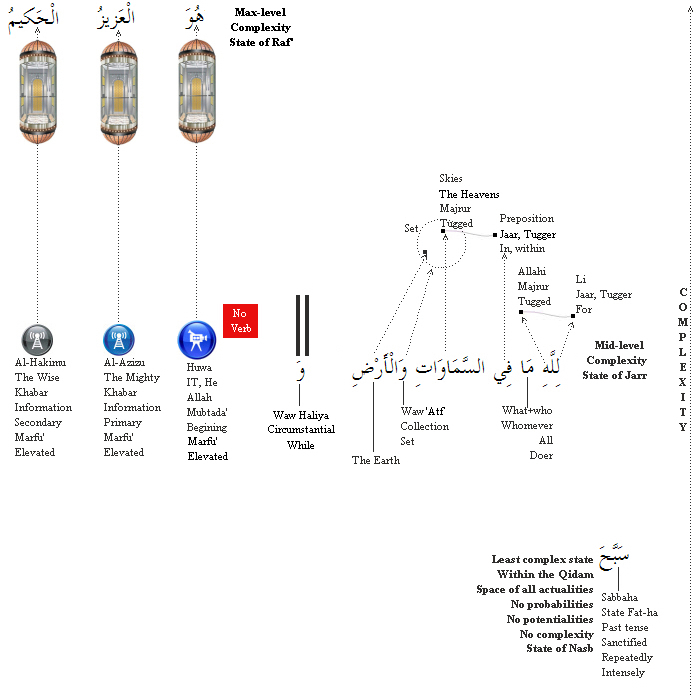
57:4
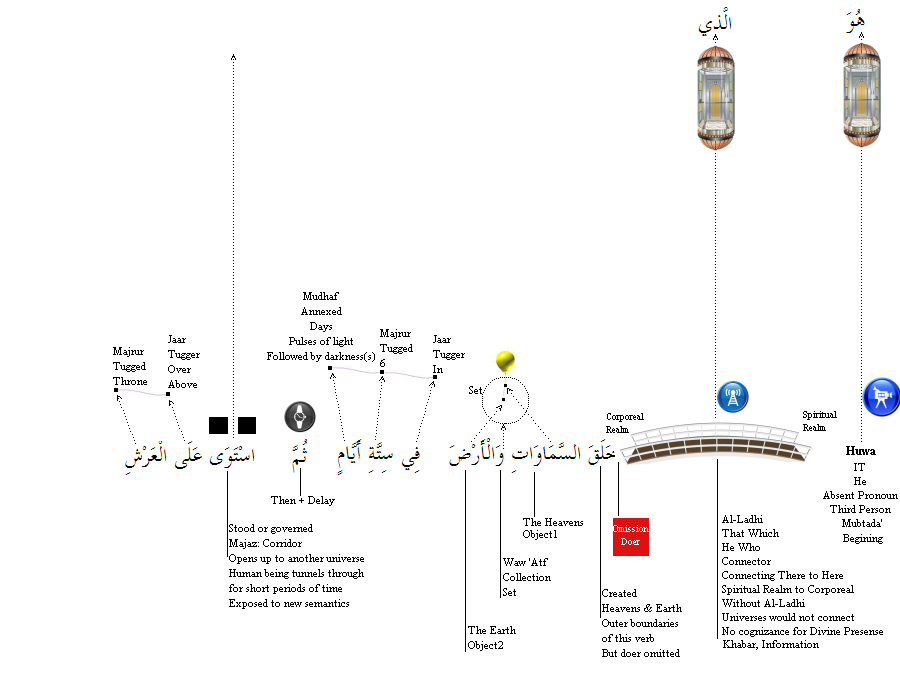
Note: Majaz (Corridor) could be rendered as a camera shutter where the person is able to take a quick glance of the other universe, or grasp a meaning from the spiritual realm. For “The + delay” see Thumma.
© 2009-2002, Dara O Shayda, Editor: A. Attar












